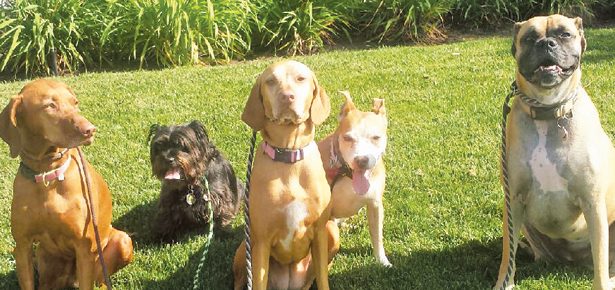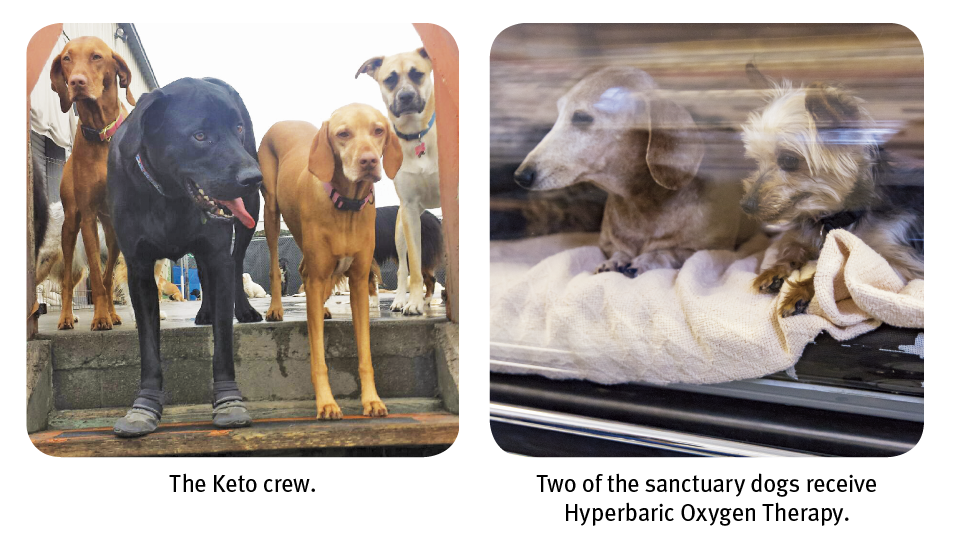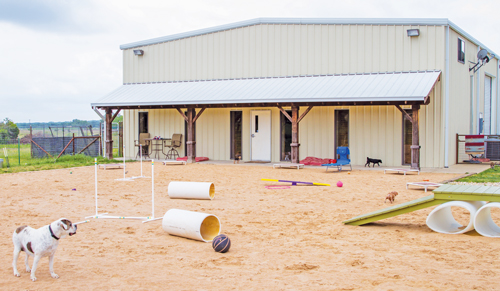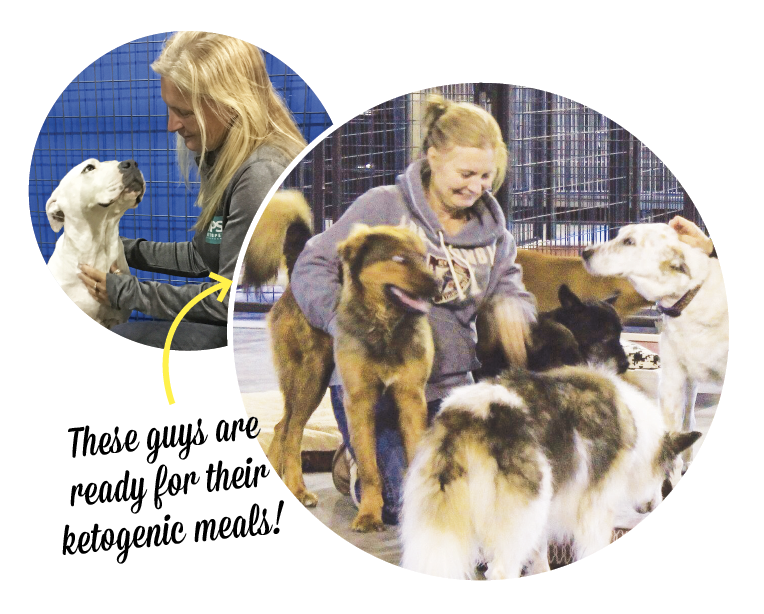

Could a Change in Diet Cure Your Dog’s Cancer?
KetoPet Sanctuary thinks so
In an unassuming gated compound in Georgetown, Texas, something amazing is taking place. KetoPet Sanctuary is taking in shelter dogs with incurable, terminal cancer—dogs with no other options who would otherwise be euthanized—and giving them a second chance, providing them with state of the art cancer treatment to miraculous result.
Upon pulling up at the sanctuary, located along a rural road 45 minutes outside of Austin, Texas, pretty much the first thing one notes is the enthusiasm of all present. The team’s passion and excitement is contagious. Also visiting are representatives from two local shelters, both of which have sent their dogs with cancer to the sanctuary for treatment. They sing glowing praises of the efforts of the KetoPet team. Together we wander the idyllic 53-acre facility, currently housing 26 dogs undergoing cancer treatment, including Pit Bull-mix Bill Murray and white-muzzled Dachshund cross Martha, petting dogs and getting the low-down on the ground-breaking work being done here.
The foundation of the KetoPet Sanctuary’s cancer-fighting approach is the ketogenic diet, which is designed to slow or halt tumor growth. The diet looks like this: 80 to 90% fat (oil such as coconut, olive or MCT), 5 to 15% protein (beef) and 5% carbohydrates (vegetables). Yes, the diet is extreme, but with reason. It’s predicated on the Warburg theory, put forth by Otto Warburg in 1924. Warburg hypothesized that cancer feeds on sugar (which is what carbohydrates break down to) but that it doesn’t process fats well. The takeaway: cut out the sugars/carbs and you’ll slow or stop the cancer.
All the dogs have weekly blood work done to monitor and evaluate the metabolic impact of the diet. CT and PET scans, conducted every 60 days, evaluate their cancers and the results being seen—results that have some prominent cancer researchers, even ones who were initially skeptical, excited.
The folks behind this remarkable initiative are the founders of Quest Nutrition, aka the makers of Quest Protein Bars. In 2014, Quest was the second fastest growing company in the US. With a stunning half a billion dollars in current annual sales, they’ve decided to put their deep pockets behind one of the most flummoxing problems humans have ever encountered: curing cancer. Despite the tremendous money and thought that has thus far been devoted to cancer’s defeat (approximately $30 billion has been devoted to cancer research funding since 2011), frustrating little headway has been made. Undeterred by the daunting nature of the task before them, the Quest founders decided to throw themselves into the fray.

Rather than rest on Quest’s staggering success, they’ve now created the Epigenix Foundation to fund research on how to reverse metabolic disease, asking questions—and finding answers—about the profound effect diet has in our lives. They are also dog lovers to the core. Many of the L.A.-based team meets in Santa Monica every Sunday morning with their dogs for a Bulletproof coffee—that would be coffee with butter or high-fat cream in it, a keto diet (for people) specialty—and to recap the week. Shannan had long wanted to open an animal sanctuary, and they began to see that combining the two projects could be a natural fit. From this the KetoPet Sanctuary was born.
One of the really cool things about their efforts at the KetoPet Sanctuary is that they’re not dependent on grant money and there is no lucrative drug patent at the end of the rainbow. They simply have the will and the finances to devote themselves to this problem.
“It's a diet that is halting and reversing cancer,” says Ron, “because only nutrition works on the many, many levels required to make the reversals to metabolism required to create an environment where cancer can't take hold. We don't use nutrition as our main tool against cancer because we have some sort of ideological leaning towards food as medicine but rather because the nutritional protocol we use is more powerful than any drug currently available. And since there's no drug at the end of this rainbow, no one has been putting any money into researching this approach—until now.”
Not ones to do things in a small way, they built out a beautiful facility. The 50-plus acre complex boasts a water park for the dogs and the interior is outfitted with beds, sofas, blankets, toys, and lots of love from the staff. But the really mind-blowing features are the human-grade diagnostics they have at their disposal.
Outfitted with state of the art (and very expensive) equipment like the PET/CT scan (a nuclear medicine imaging test that uses a form of radioactive sugar to create images of body function and metabolism and can be used to evaluate normal and abnormal biological function of cells and organs), they’re devoting themselves to answer some very interesting cancer questions by assessing the ketogenic diet’s effects.
They also have two hyperbaric oxygen chambers they employ as a complementary therapy and all of the dogs take part in metabolic conditioning or MetCon, as they call it. MetCon is another key tenant of their cancer-fighting approach, involving strenuous physical activity comprised of a very high work rate, using exercises designed to burn more calories during the workout and maximize calories burned after the workout. This type of physical activity provides a host of benefits for both humans as well as dogs, including increased heart rate (leading to greater heart health and conditioning), increased mitochondrial function and efficiency, and better nutrient partitioning abilities.
One of their most impressive success stories to date is that of Cali, a six-year-old Vizsla who underwent treatment at the KetoPet Sanctuary for hemangiosarcoma and, through the protocol, reversed six tumors and is now cancer free. Following her successful treatment, Cali was officially adopted by Shannan and Ron and was entered in this year’s American Humane Association Hero Dog Awards in the Emerging Hero Dog category. The nomination was in recognition of Cali’s part in the research on nutritional intervention in the fight against cancer, the findings from which have promising applications for both people and dogs.
A Los Angeles counterpart to the Georgetown Sanctuary is in the works, eventually, a keto diet for pets you can purchase. The KetoPet team readily acknowledges that it’s hard for owners to manage this diet on their own and aims to make it more accessible. Until then, if you know of a dog that needs help or would be a good fit for the program, email help@ketopetsanctuary.com. And if you’d like to donate to their efforts (the non-profit sanctuary is 501-C status pending) or want to get involved with their groundbreaking research, they would love to have your assistance. Visit ketopetsanctuary.com to learn more about their mission and help spread the word.
What Is A Ketogenic Diet?
A ketogenic diet is typically defined as a high-fat, moderate protein, and low-carb diet, but it goes beyond that. The true meaning of the ketogenic diet is any nutritional approach that encourages the body to produce ketones.
What are ketones? Ketones are simply short-chain fats that are produced in your liver to be used for energy.
Eating ketogenically and using ketones for fuel has been shown to provide a host of overall health benefits, including increased cognitive function, improved insulin sensitivity, and enhanced performance.
Join the newsletter and never miss out on dog content again!
"*" indicates required fields
By clicking the arrow, you agree to our web Terms of Use and Privacy & Cookie Policy. Easy unsubscribe links are provided in every email.








